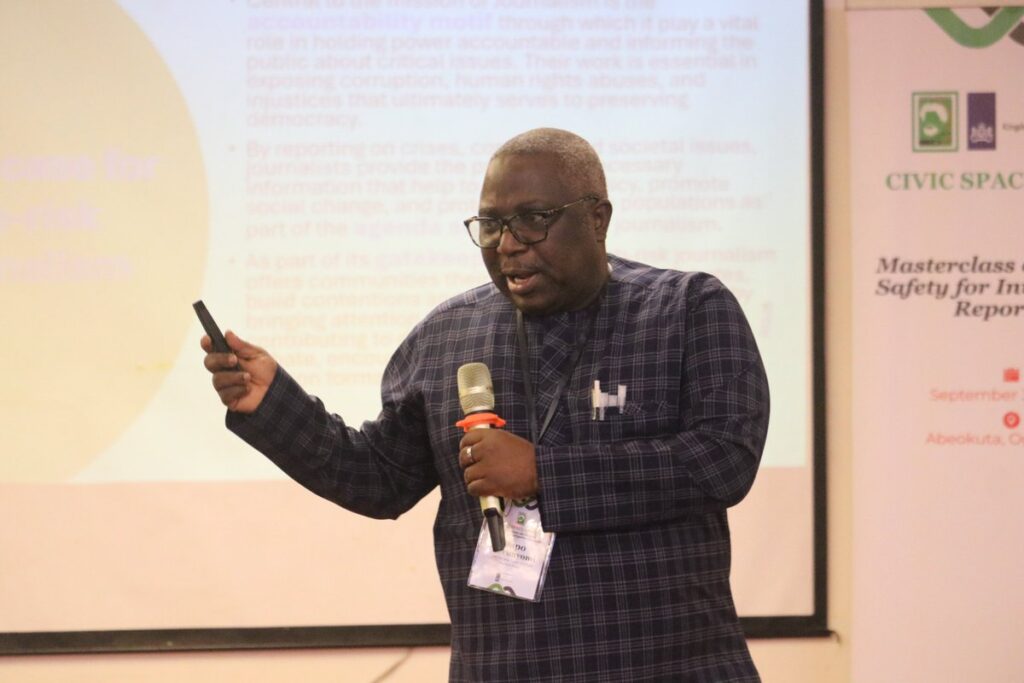Publisher of Premium Times and Founder, Wole Soyinka Centre for Investigative Journalism (WSCIJ), Dapo Olorunyomi has said that safety of journalists is necessary to guarantee freedom of the press.
Olorunyomi made the assertion during the Civic Space Guard: a Masterclass on Holistic Safety for Investigative Reporters organised by WSCIJ with the support of the Embassy of the Kingdom of the Netherlands in Nigeria.
According to him, the pursuit of press freedom is futile without ensuring journalists’ safety, as the safety of journalists is fundamental to achieving true press freedom.
“There are four components of press freedom: first, laws that constrain our ability to do our work must be removed; second, the media must be pluralistic and diverse; third, it must remain independent from external forces; and most importantly, the safety of journalists must be guaranteed,” he stated, adding that, “If the safety of journalists is not brought to bear, every other thing that we do is wasted”.
He advised that thorough research on the political climate, cultural norms, recent press incidents, and ongoing training are crucial for making sound decisions and enhancing preparedness in hostile environments.
“Journalists cannot be free if they are not safe,” he reiterated.
He also noted that investigative journalism does not always require going undercover or engaging in high-risk activities and advised journalists to avoid high-risk areas and situations when possible.
Managing Editor, Northern Operations, The Nation Newspaper, Yusuf Alli said journalists should be conversant with the basic laws that bind the profession to perform their duties effectively.
According to him, the media is not isolated from the society it operates and the investigative journalist should be guided by the ethics of the job.
“When you maintain your ethical ground, it will set you apart”, he explained.
Alli stressed the importance of building and maintaining professional relationships.
“Contact is the lifeblood of journalism. A journalist must build relationships without compromising integrity. Your contacts are your worth and asset on the job. Avoid exploiting them”, he added.
Publisher of PRNigeria, Yushau Shuaib, echoed the same sentiment as Alli, emphasising the need for building professional relationships.
“In the line of duty, while engaging with law enforcement, investigative journalists must establish relationships with law enforcement agents. To minimise risks, reporters must disclose their identity, choose safe locations and understand their rights”, Shuaib explained.
He therefore outlined the role journalists play in society to include uncovering hidden information, holding powerful entities accountable, and exposing wrongdoing and unethical behavior all while presenting complex issues in compelling and clear narratives,” he said.
According to him, responsible journalism promotes trust, credibility, and public understanding, ultimately contributing to a well-informed citizenry.
Cybersecurity Professional with Resilience Technologies Africa, Elizabeth Kolade, highlighted the growing importance of safeguarding information in the digital age.
“With rising reliance on the internet, data breaches, cyberattacks on operations and reputations, and stricter data protection laws, safeguarding information has never been more vital for investigative journalists,” Kolade said.
“Apart from surveillance technologies, website defacement and phishing campaigns, journalists must be aware of internal attacks, denial of service attacks, disinformation and smear campaigns to stay safe”, Kolade added warning media organisations and journalists “to run from cracked or free software or applications requesting for access to their phone contact and camera”.
Executive Director, WSCIJ, Mrs Motunrayo Alaka, noted that though investigative journalism is challenging, it is the most important genre of journalism.
She stressed the importance of evidence in reporting to ensure journalists win libel cases and justice for the subject of your story.
Speaking on the reason for the Masterclass, she stated that journalists in Nigeria face increasing risks, including cyberattacks, data breaches, and surveillance.
She revealed that in 2023 alone, at least 28 journalists were unlawfully detained, harassed, or intimidated during the general elections, and 56 journalists were attacked during the #EndBadGovernance protests.
“These figures underscore the urgent need for enhanced safety measures,” Alaka explained.


